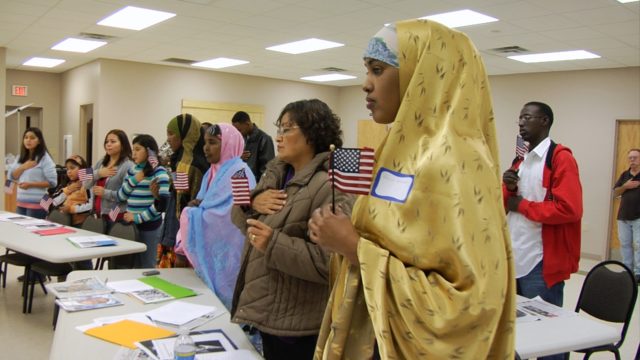
What does “becoming American” mean to you? Is it a process? A state of mind? An act of participation? When one becomes American, what’s more important: the destination or the journey?
That’s both the title and the central theme behind the six-week documentary film and discussion series debuting at the Museum of Boulder on Jan. 22: Becoming American.
Made possible by the National Endowments for the Humanities, Boulder will be one of several cities around the U.S. programming the Becoming American series — created in collaboration by City Lore, the Immigration and Ethnic History Society, and the International Coalition of the Sites of Consciousness. The series runs on Tuesdays through Feb. 26 and covers topics on immigration waves, refugee integration and immigrant acceptance through various aspects of culture — all ripe for contemporary application in a city like Boulder.
“I think we have interesting ways of talking about Boulder as not being diverse when it actually is,” says Megan Moriarty, the museum’s director of community engagement. “In one regard, I hope people just think about this topic differently and may be able to meet some neighbors who are more recent immigrants and give that personal connection.”
And though the series addresses immigration in a national context, Moriarty is using it to address local issues as well.
On display in conjunction with Becoming American, Donna Laurita’s The Silhouette Project is a visual story project the photographer and personal historian began in 2016 to give voice to those relegated to the shadows.
“It’s a cool way of having people see a bit of the diversity in Boulder that sometimes goes unaccounted for,” Moriarty says.
“Folks can watch the films, participate in the conversations after the films and check out this exhibit that tells the stories of folks who have come to Boulder from all around the world.”
Helping to facilitate these stories will be University of Colorado Boulder professor Nicholas Villanueva, who will introduce each screening and moderate the discussions that follow. “[Villanueva] can also add a more regional aspect,” Moriarty explains. “The material really does focus a lot on the urban areas, and I think Colorado’s story is in some way similar but also very different.”
Villanueva’s aim is similar.
“The majority of people in attendance will not be of that ethnic, religious or racial group [presented in the film] and [will be] more interested in learning about the difference in our society,” he says.
Villanueva comes with extensive knowledge of immigrant studies, particularly violence against immigrant communities. His 2017 scholastic book, Lynching of Mexicans in the Texas Borderlands, covers racial-tension along the southern U.S. border during the 1910 Mexican Revolution with topics and concerns as familiar as today’s headlines.
“The sound bites are the same,” Villanueva says. “A hundred years later — literally a hundred years later from some of the chapters I have in this book to today — we’re experiencing the same xenophobic rhetoric, the same call to arms on the border and the detaining of immigrants on the border.”
Though Villanueva will focus on more than the Latin American experience, he is quick to note these stories echo across the chasm of history.
“The criminalization of an ethnic group — or a larger group: an ethnic category — is occurring today in similar ways it occurred throughout the 20th century,” Villanueva says. “When it comes down to it, the dominant group of people in power fears any loss of that power.
“And I wouldn’t say it’s losing it,” Villanueva continues. “It’s sharing it.”
But, as Villanueva is quick to point out, sharing and loss mean different things to different people.
“It depends on how you look at it,” he says.
How you look at it is precisely the purpose behind Becoming American. Here is a chance to understand the present through the prism of the past, a view all too often ignored by those fixated on the now.
On the Bill: Becoming American: An Immigration Film and Discussion Series. Tuesdays. Jan. 22 — The Century of Immigration: 1820-1924; Jan. 29 — Promise and Prejudice; Feb. 5 — Between Two Worlds: Identity and Acculturation; Feb. 12 — Help Wanted? Immigration and Work; Feb. 19 — Family and Community; Feb. 26 — Popular Culture and Immigration. Museum of Boulder, 2205 Broadway, Boulder, 303-449-3464. All events are free and open to the public. Please RSVP online at museumofboulder.org/event/becoming-american/all/














